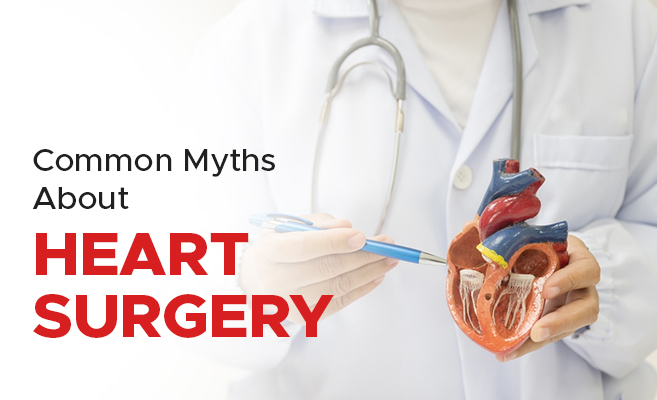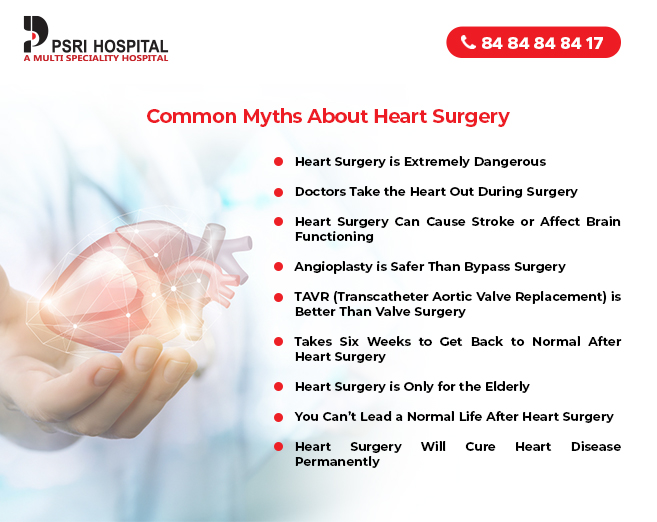Common Myths About Heart Surgery

The heart is a vital organ that significantly impacts our well-being and physical functioning. Our heart is tirelessly pumping day and night, delivering oxygen and nutrients throughout the body. Maintaining our heart health is essential, but it is often misunderstood. Heart surgery is sometimes necessary to treat certain heart conditions. However, many myths and misconceptions surround this critical procedure, often causing unnecessary worry and hesitation among patients. This blog aims to educate you about the importance of heart health and debunk common myths about heart disease, empowering you with knowledge and peace of mind.
When You May Need Heart Surgery
Your doctor may recommend heart surgery when non-invasive treatments or lifestyle changes are not enough to address certain heart conditions. These may include coronary artery disease, heart valve disorders, congenital heart defects, or other heart-related issues that pose a significant risk to your health. Understanding when heart surgery may be necessary can help you make informed decisions and take proactive measures to protect your heart’s health.

Debunking Common Myths About Heart Surgery
Heart surgery is enveloped by myths that can cloud your understanding and decision-making. Let’s address these myths and facts about cardiac surgery:
Myth: Heart Surgery is Extremely Dangerous
One common myth is that heart surgery is extremely dangerous. While it is true that any surgery carries risks, advancements in medical technology, surgical techniques, and post-operative care have made heart surgeries significantly safer. Experienced cardiac surgeons and advanced facilities have low complication rates and high success rates.
Myth: Doctors Take the Heart Out During Surgery
Many believe that during heart surgery, the heart is physically removed from the body. This is not true. The heart remains in the body throughout the procedure. Surgeons use specialized equipment to access and operate on the heart while it remains in its anatomical position.
Myth: Heart Surgery Can Cause Stroke or Affect Brain Functioning
There is a small risk of stroke or neurological complications with any major surgery. However, modern techniques and protocols have significantly reduced these risks in heart surgery. Surgeons and medical teams take extensive precautions to minimize the risk of stroke or brain injury during the procedure.
Myth: Angioplasty is Safer Than Bypass Surgery
The choice between angioplasty and bypass surgery (open-heart surgery) depends on the severity and complexity of the patient’s condition. While angioplasty may be suitable for some cases where the blockage is less or having comorbidities, bypass surgery is often recommended for more advanced or complex cases of coronary artery disease. Both procedures have risks and benefits, and the decision should be made by a qualified cardiologist or cardiac surgeon based on the patient’s specific circumstances.
Myth: TAVR (Transcatheter Aortic Valve Replacement) is Better Than Valve Surgery
TAVR is a minimally invasive procedure that has revolutionized the treatment of certain valve disorders related to Aortic Valve only particularly for high-risk patients. However, it is not universally better than traditional valve surgery. The choice between TAVR and valve surgery depends on factors such as the Diseased Valve, patient’s age, overall health condition, and the specific valve disorder being treated. Both procedures have advantages and limitations, and the decision should be made in consultation with an experienced cardiologist & cardiac surgeon.
Myth: It Takes Six Weeks to Get Back to Normal After Heart Surgery
The recovery time after heart surgery can vary greatly depending on the type of procedure, the patient’s age, overall health, and other individual factors. While some patients may require a longer recovery period, many are able to resume normal activities within a few weeks, often sooner than the commonly perceived six-week timeline. Your healthcare team will provide personalized guidance and rehabilitation plans to ensure a safe and efficient recovery.
Myth: Heart Surgery is Only for the Elderly
Many people believe that heart surgery is reserved exclusively for older adults. However, heart conditions requiring surgery can occur at any age depending on genetic factors, lifestyle, and overall health. Pediatric cardiologists and surgeons are specially trained to perform heart surgeries on children when necessary. So, heart surgery spans all ages, and decisions are based on medical needs, not just age.
Myth: You Can’t Lead a Normal Life After Heart Surgery
This is a common fear but far from the truth. Many patients return to their regular, daily activities after recovering from heart surgery. With modern surgical techniques and comprehensive rehabilitation programs, patients often find they can enjoy even more active lives post-surgery due to improved heart function and better overall health.
Myth: Heart Surgery Will Cure Heart Disease Permanently
While heart surgery can effectively address specificproblems within the heart, it is not a cure for heart disease itself. Ongoing lifestyle adjustments, medication, and regular check-ups are crucial to managing heart health long-term. Surgery is a significant step towards better health, but maintaining heart health requires a lifelong commitment to healthy habits and regular medical care.
Why PSRI Hospital is the Best Choice for Heart Surgery
By choosing PSRI Hospital, you are opting for a heart specialist hospital in Delhi that not only uses advanced technology but also values patient education and transparency. We strive to ensure that all our patients feel confident and informed about their heart care choices. With a best cardiologist in Delhi NCR, we are dedicated to providing the highest quality care and helping you achieve the best possible health outcomes. Understanding the truth behind these myths can empower you to make more informed decisions regarding your heart health.
FAQs
How long do I need to stay in the hospital after heart surgery?
Ans. Typically, patients may need to stay in the hospital for about 5 to 7 days after surgery, depending on their recovery progress and specific procedure.
What are the signs that I might need heart surgery?
Ans. Symptoms such as severe chest pain, difficulty breathing, extreme fatigue, and irregular heartbeat can indicate that you might need to consult with a cardiologist for potential heart surgery.
Is heart surgery covered by insurance?
Ans. Most health insurance plans cover heart surgery, but coverage can vary. It’s important to check with your insurance provider for details about what is included in your specific plan.
Can I exercise after heart surgery?
Ans. Yes, exercise is an important part of recovery after heart surgery. However, it should be resumed gradually under the guidance of your healthcare provider to ensure it is done safely.

 Book An Appointment
Book An Appointment Virtual Consultation
Virtual Consultation




